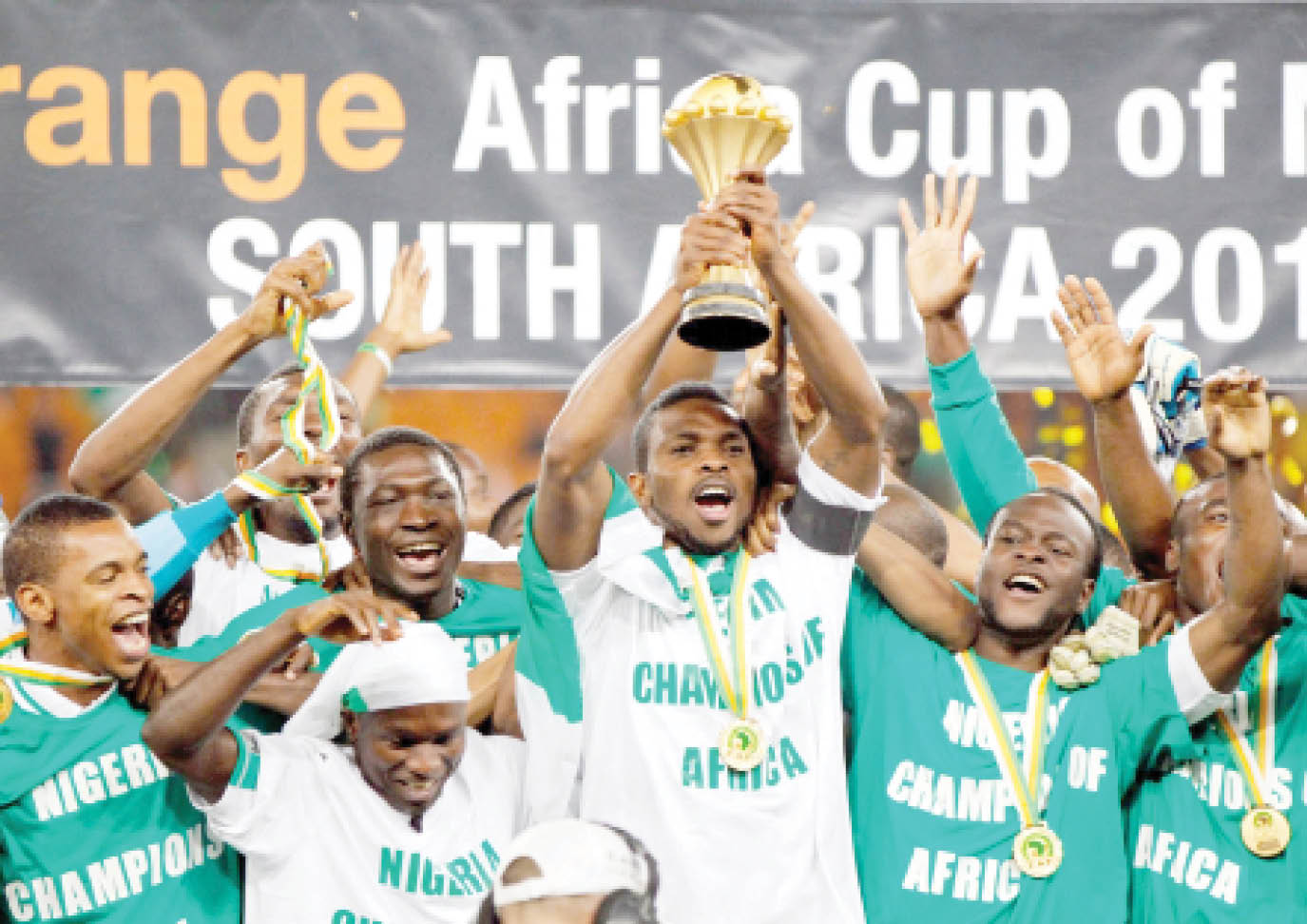The stage is set for the 33rd edition of the Africa Cup of Nations (AFCON) where 24 nations including Nigeria will seek to win the most coveted trophy on the continent.
The 2013 champions arrived in Garoua, Cameroon from Abuja via a chartered flight in the early hours of Thursday and are battle-ready to do the nation proud again.
- Nearly 2,000 journalists die of COVID-19 in 94 countries
- We can’t leave auto repair for any other job – Kaduna graduates
With the first game next week Tuesday, Trust Sports takes a look at Nigeria’s participation from 1963 till date as well as the chances of making it out of the group in Cameroon.
Nigeria’s AFCON journey so far
In 1963, Nigeria made her debut in Africa’s flagship football championship, the Africa Cup of Nations but failed to qualify for the next stage.
Efforts to make a name on the same stage failed as the Green Eagles as they were known then failed to even qualify for the next five editions from 1965 to 1974.
They however returned for the 1976 edition and ended the campaign in the 3rd position and repeated the same feat again in the 1978 edition. After winning the bronze on two occasions, Nigeria upped the ante and won her first trophy in 1980. The win was sweeter as the country hosted the continent.
With all eyes on the team and with high expectations, Nigeria as holders to the chagrin of fans failed to defend the title as they were hounded out of the competition in the first round in the 1982 edition. Reeling from the failure, the team made amends in the 1984 edition and got to the finals but lost to Cameroon.
However, Nigeria failed again to qualify for the 1986 edition but returned in 1988, 1990 editions to again painfully lose to Cameroon and Algeria in the finals.
In the 1992 edition, the Green Eagles came third and in 1994 the ‘Green Eagles’ gave way once again to ‘Super Eagles’ after the national team conquered the rest of Africa at the African Cup of Nations and also qualified for the World Cup for the first time.
However, Nigeria withdrew from the 1996 editions due to a political row between Nigeria and the host nation, South Africa and in 1998, CAF banned Nigeria from participating because of withdrawing from the previous edition.
In 2000, Nigeria again returned as co-host with Ghana and for the third time, lost the finals to Cameroon who were gradually becoming the country’s albatross to continental glory.
The Super Eagles came third in the following three editions (2002, 2004 and 2008) and crashed out in the quarter-finals in 2008.
Nigeria again came third in 2010 and failed to make an appearance in the 2012 edition but returned triumphantly in 2013 to win the trophy for the third time.
It will be noted that the tournament was held in 2013 instead of 2014 because CAF decided to hold the Mundial in odd years to avoid a clash with FIFA World Cup.
Nigeria failed again to qualify for the 2015 and 2017 editions but in 2019, came third for a record 8th time.
In summary, Nigeria has won the trophy three times (1980, 1994 and 2013), finished as runners-up four times (1984, 1988, 1990 and 2000) and picked up the bronze medals eight times (1976, 1978, 1992, 2002, 2004, 2006, 2010 and 2019).
The hurdles ahead
Despite the recent shakeup in the technical bench that involved the sack of Nigeria’s longest-serving coach, Gernot Rohr and the appointment of Augustine Eguavoen on an interim basis, the Super Eagles are primed to fly high in Cameroon.
Though the Nigeria Football Federation (NFF) have appointed Portuguese tactician, Jose Peseiro as Rohr’s successor, he will only be in Cameroon to observe the team.
The Super Eagles had a couple of training sessions in Abuja but not with the full squad. The team played 15-time Cameroon champions, Cotonsport yesterday in the only warm-up lined up for the team.
– Egypt
The Pharaohs’ will be the Eagles first test in Cameroon on January 11 at the Roumde Adjia stadium, Garoua and the Egyptians will be seeking to make it 9 wins in 19 meetings with the Nigerians. Nigeria however won the last clash between both sides in 2019.
Egypt have a better record in the competition having won seven titles– 1957, 1959, 1986, 1998, 2006, 2008, and 2010 – they are the most successful team in the competition. Bookmakers including this writer see the spoils of war shared evenly. The game should end in a draw.
– Sudan
Nigeria’s next game will be against 1970 champions, Sudan and will be looking to make it 9 wins in 15 games. Records have it that Nigeria has won 8 games, drew 4 and lost 2 against the Sudanese.
Nigeria and Sudan met at the 1963 AFCON, a game the latter won 4-0 while the last meeting between both nations in 2014 and Nigeria emerged victorious with a 3-1 scoreline.
Nigeria has a better pedigree on paper but the job is done on the pitch. However, the Eagles should fly over the Sudanese comfortably.
– Guinea Bissau
This will be the first time Nigeria will be meeting Guinea-Bissau at the international level on January 19 in what will be the last group game. Expectedly, Nigeria with an array of stars should also win this game but not take them for granted. There are no more minnows in African football.
By and large, after these games, Nigeria should qualify to the next round of the competition and gradually battle their way to the finals.

 Join Daily Trust WhatsApp Community For Quick Access To News and Happenings Around You.
Join Daily Trust WhatsApp Community For Quick Access To News and Happenings Around You.


